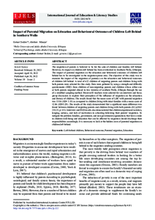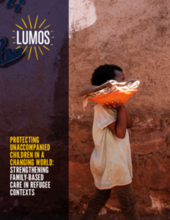childrens_living_arrangement
children_living_without_bio
Displaying 11 - 20 of 158
The migration of parents is believed to be for the sake of children and families left behind. However, its impact on children left behind has been overlooked in Southern Wollo, Ethioipia. The impact of parental migration on the education and behavioral outcomes of children left behind has to be investigated in the migration-prone area. The objective of this study was to examine the impact of the migration of parent(s) on the education and behavioral outcomes of children left behind.
The war in Ukraine is set to tip more families in the Horn of Africa over the edge. The region has become increasingly dependent on imported grains from Russia and Ukraine. Ethiopia, Kenya and Somalia import 67 percent, 89 percent and 92 percent of their wheat respectively from the two countries. Russia and Ukraine also account for 53 percent of the global trade of sunflower oil and seed. However, supply lines are blocked and, in areas of Ukraine, agricultural production is in danger. The prices of cooking oil, bread and wheat flour are already reaching new records in local markets in the Horn of Africa. A dire nutrition crisis is expected to escalate.
The United Nations says food distribution in Ethiopia’s blockaded Tigray region has reached its “all-time lowest” while more than 50,000 children are thought to be severely malnourished, the latest sign of growing crisis amid efforts to end the country’s 14-month war.
Nearly 200 young children have died of starvation in hospitals across Ethiopia’s Tigray region as malnutrition soars one year after a brutal conflict broke out, according to data collected by local doctors and researchers.
Join this online event to learn what kinship care looks like in different contexts and why recognising it is so important.
This paper explores how adoptive parents, with knowledge of exploitation in their own adoptions, are responding emotionally and pragmatically.
Through interviews with adoptive parents, this study explores what and how adoption-related exploitation occurred in Ethiopia.
UNICEF is seeking a consultant to provide technical inputs for the Alternative Childcare Directive of the Government of Ethiopia.
This article presents the case for an independent care leaving policy in Ethiopia to address the multifaceted needs of children in care and improve the care leaving service in the country.
Lumos worked together with partners on the family-based care for unaccompanied children project between 2018 and 2020, in four camps in the Tigray region of Ethiopia. This evaluation report considers the various components of the project and provides recommendations to child protection and refugee response practitioners, with the aim of improving the quality of child protection programming and its impact on unaccompanied children in refugee contexts.


